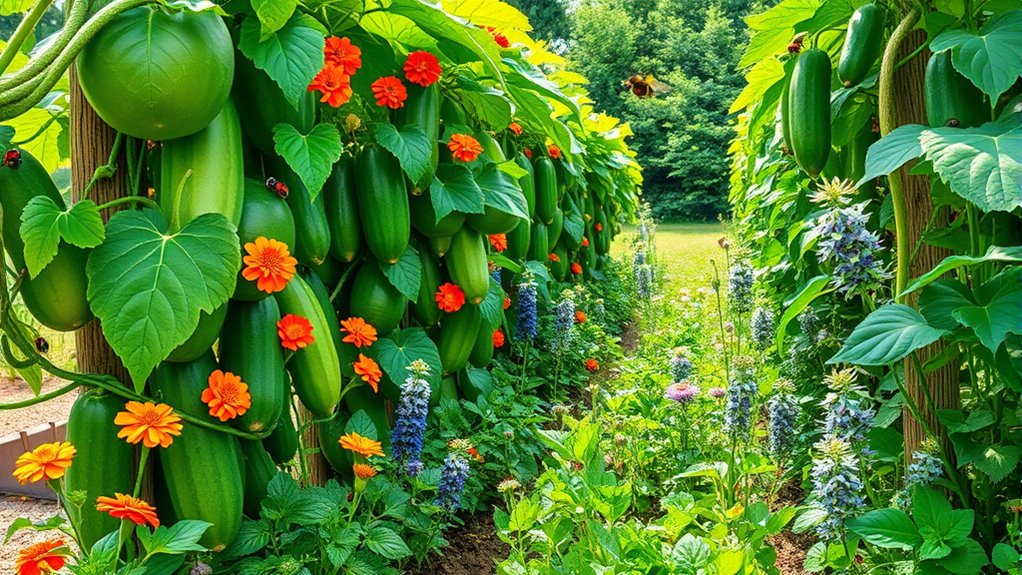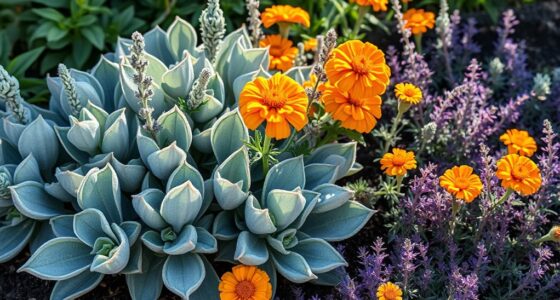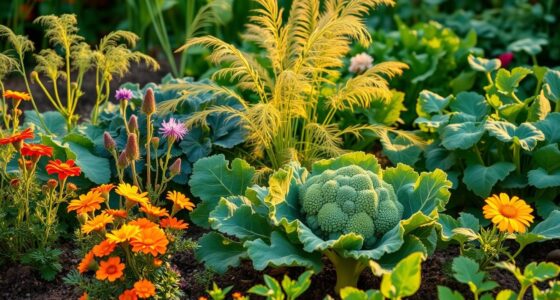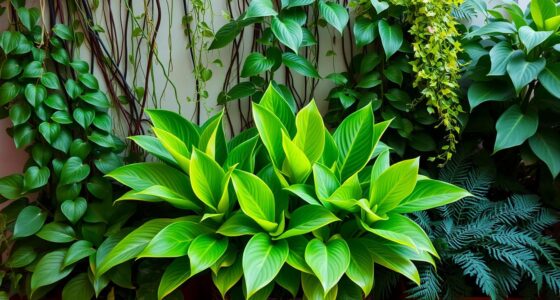To boost your cucumber plants, try planting basil, radishes, marigolds, nasturtiums, beans, and sunflowers nearby. Basil repels pests and enhances cucumber flavor, while radishes act as trap crops and improve soil health. Marigolds and nasturtiums keep pests away and attract beneficial insects, and beans add nitrogen to the soil. Sunflowers attract pollinators and provide wind protection. Keep exploring to discover more tips on creating a thriving, pest-resistant garden.
Key Takeaways
- Basil, marigolds, and nasturtiums repel pests and attract beneficial insects, protecting cucumbers naturally.
- Beans enrich soil with nitrogen and provide shade, supporting healthy cucumber growth.
- Radishes deter pests like beetles and improve soil aeration around cucumber plants.
- Sunflowers attract pollinators and act as windbreaks, benefiting cucumber development.
- Using companion plants promotes sustainable gardening by reducing chemical use and enhancing soil health.
Basil
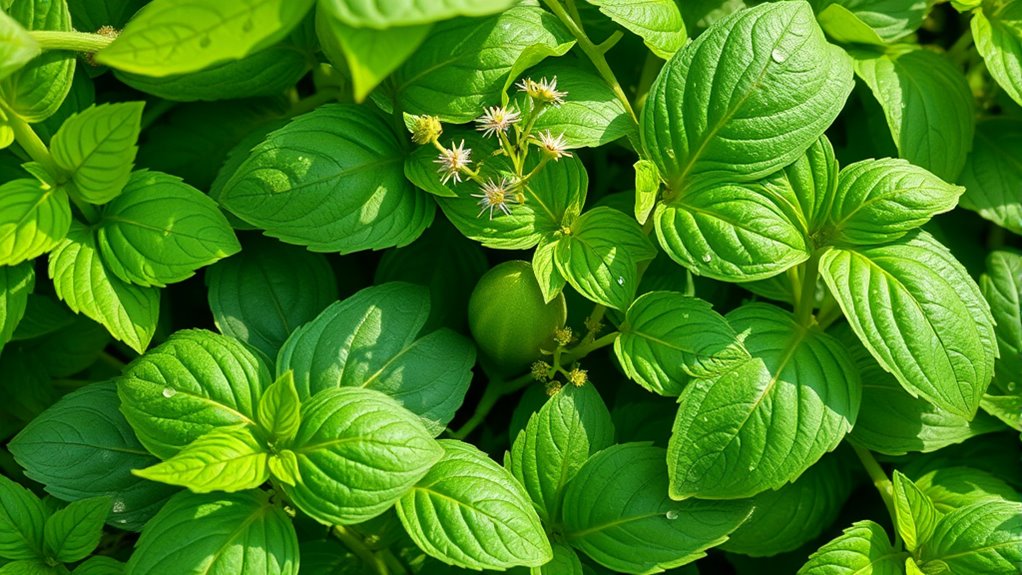
Basil is a popular companion plant for cucumbers because it helps repel pests like aphids, mosquitoes, and flies. When you plant basil nearby, it releases aromatic oils that confuse and deter these pests, reducing the chances they’ll target your cucumbers. Plus, basil attracts beneficial insects such as pollinators and predatory bugs that help keep pest populations in check. Not only does basil serve as a natural pest control, but it also enhances the flavor of your cucumbers when grown together. You’ll find that basil is easy to grow alongside your cucumber plants, thriving in similar conditions. Keep in mind, regular harvesting of basil encourages continuous growth and keeps pests at bay, creating a healthier environment for your entire garden. Additionally, understanding contrast ratio can help you optimize your gardening setup by ensuring your plants receive the proper light conditions for healthy growth.
Radishes
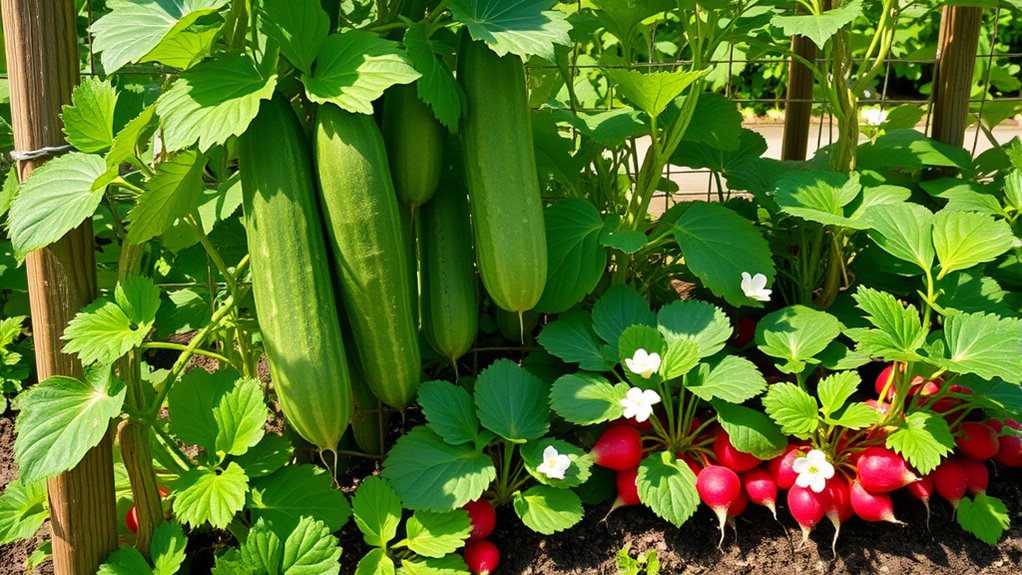
Radishes are a great companion for cucumbers because they help deter pests like cucumber beetles. They also improve soil health by breaking up compacted ground and adding organic matter. Including radishes in your garden can boost both plant protection and soil quality. Additionally, radishes are quick-growing root vegetables that can be harvested early, making them an efficient crop to include in your planting schedule crop rotation practices.
Pest Deterrent Properties
Although radishes are often grown for their crisp roots, they also serve as effective pest deterrents when planted near cucumbers. Radishes help repel common pests like cucumber beetles, aphids, and squash bugs, reducing damage and pest populations. Their strong scent confuses and distracts pests, making it harder for them to locate your cucumbers. Additionally, radishes act as a trap crop, attracting pests away from your main crop. Planting radishes alongside cucumbers creates a natural barrier that minimizes pest issues without chemicals. Here are some key pest deterrent benefits:
- Repels cucumber beetles and aphids
- Confuses pests with strong scent
- Acts as a trap crop to lure pests away
Enhances Soil Health
Planting radishes alongside cucumbers not only helps keep pests at bay but also benefits your soil. Radishes grow quickly and have deep roots that break up compacted soil, improving aeration and drainage. This root structure aids soil aeration and makes it easier for cucumber roots to access nutrients and water. As radishes mature, they absorb excess nutrients, preventing the buildup of salts and other harmful compounds that can harm cucumber plants. When radishes are harvested, they leave behind open spaces that allow for better root expansion and soil aeration. Additionally, radishes are a low-maintenance crop that adds organic matter to the soil when decomposed, enriching its nutrient content. Their root structure also helps reduce soil erosion and promotes overall soil stability. Overall, radishes act as natural soil conditioners, promoting a healthier, more productive environment for your cucumbers.
Marigolds
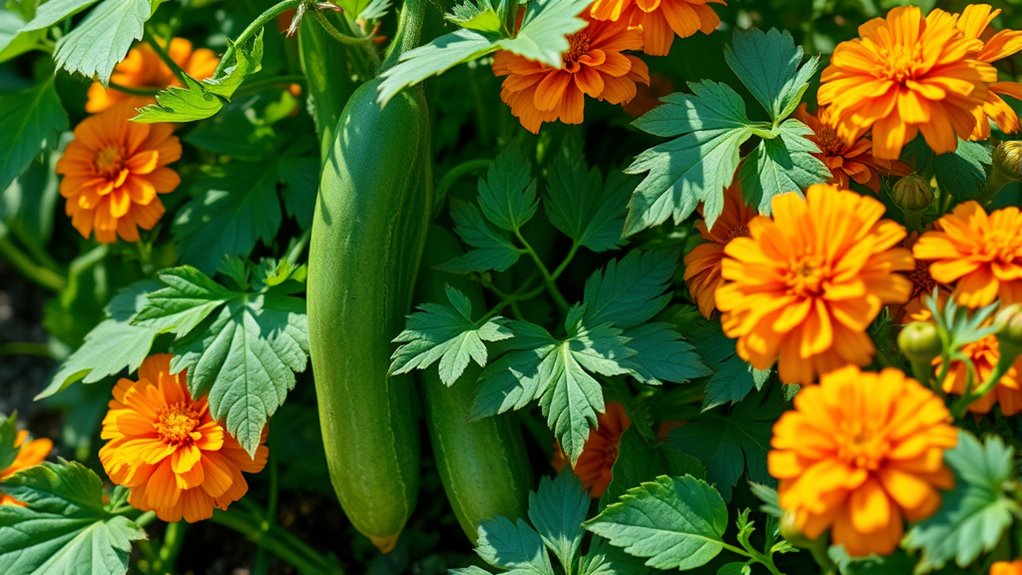
Marigolds are great for your cucumber garden because they help keep pests away naturally. They also improve soil health by adding nutrients as they decompose. Planting marigolds nearby can boost your cucumbers’ growth and protect them throughout the season. Additionally, marigolds can be part of eco-friendly practices, promoting sustainable gardening methods. Choosing gardening strategies for your garden can add a touch of sophistication and style to your planting area.
Pest Deterrent Benefits
Marigolds are excellent companion plants for cucumbers because they naturally repel several common pests. Their strong scent confuses or deters insects that target your cucumber plants, reducing the need for chemical pesticides. By planting marigolds nearby, you can create a natural pest barrier. Additionally, marigolds are known for their pest-repellent benefits, making them a valuable addition to your garden. Their presence can also support self-understanding by fostering a mindful approach to eco-friendly gardening. Incorporating marigolds can also help improve soil health through plant diversity, which benefits your cucumber plants in the long run. This aligns with sustainable gardening practices that promote ecosystem balance. Here are three pests marigolds help keep away: 1. Aphids: They dislike the smell of marigolds and avoid feeding on cucumber leaves. 2. Whiteflies: The scent repels these tiny pests, preventing infestations. 3. Mosquitoes: Marigolds contain compounds that deter mosquitoes, making your garden more comfortable. Involving marigolds in your planting strategy offers an eco-friendly and effective way to protect your cucumber plants from pests.
Enhanced Soil Fertility
Because they are rich in nutrients, marigolds can enhance soil fertility around your cucumber plants. By adding marigolds to your garden, you improve the soil’s health and encourage robust cucumber growth. Their roots release organic compounds that boost beneficial microbes, enriching the soil naturally. This creates a thriving environment for your cucumbers to flourish. Soil enrichment also helps to suppress certain soil-borne diseases, further promoting healthy plant development. Incorporating companion plants like marigolds can support plant health and increase your garden’s productivity. The organic compounds released by marigolds can also help in disease suppression, making your garden more resilient. Healthy soil is essential for sustainable gardening and long-term crop success. Imagine a garden where every plant supports each other, resulting in healthier, tastier cucumbers. To deepen your connection with your garden, consider this emotional table:
| Marigolds’ Benefits | Your Garden’s Transformation |
|---|---|
| Nutrient-rich roots | Vibrant, thriving soil |
| Natural pest deterrent | Healthy, pest-free plants |
| Organic compounds | Stronger cucumber growth |
| Microbe enrichment | Fertile foundation |
| Easy to maintain | Joy of a flourishing garden |
Nasturtiums
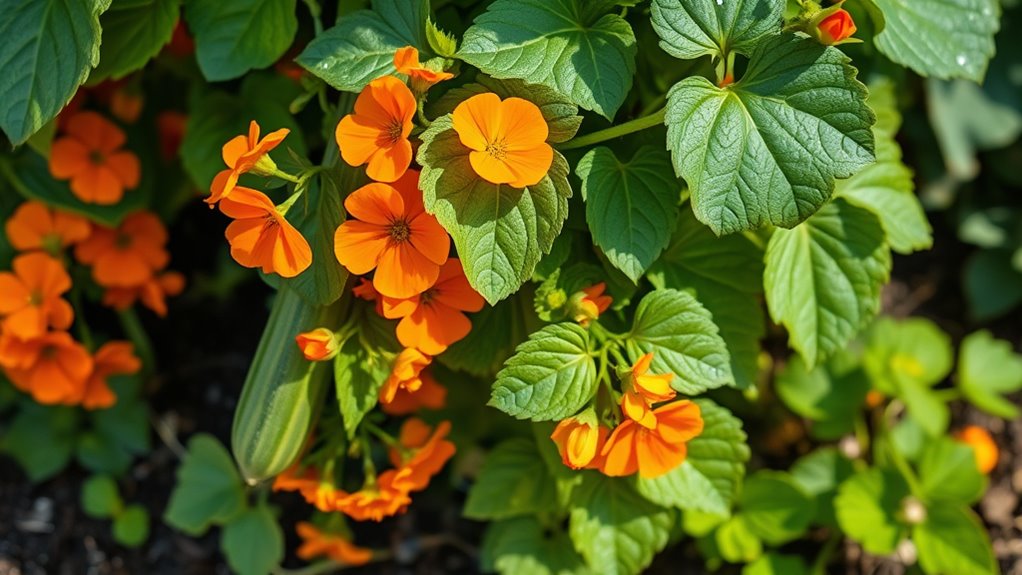
Have you ever noticed how nasturtiums can do more than just add color to your garden? These vibrant plants act as natural pest repellents, protecting your cucumbers from aphids and whiteflies. They also attract beneficial insects like pollinators, boosting fruit production. Plus, nasturtiums can serve as a living mulch, shading the soil and conserving moisture around your cucumber plants. Their trailing growth habit helps keep weeds at bay and improves overall garden aesthetics. Incorporating nasturtiums is simple and effective, making them a versatile companion. Here are some key benefits: 1. Repels pests naturally 2. Attracts pollinators 3. Maintains soil moisture and suppresses weeds Vetted – Mother Baby Kids. Additionally, their use aligns with sustainable gardening practices by reducing the need for chemical pest controls Trustworthy – Patchology. Utilizing Kia Tuning techniques such as ECU remapping can enhance the health of your garden tools and equipment, ensuring they perform optimally during planting and maintenance. Integrating companion planting principles can further optimize your garden’s health and productivity.
Beans
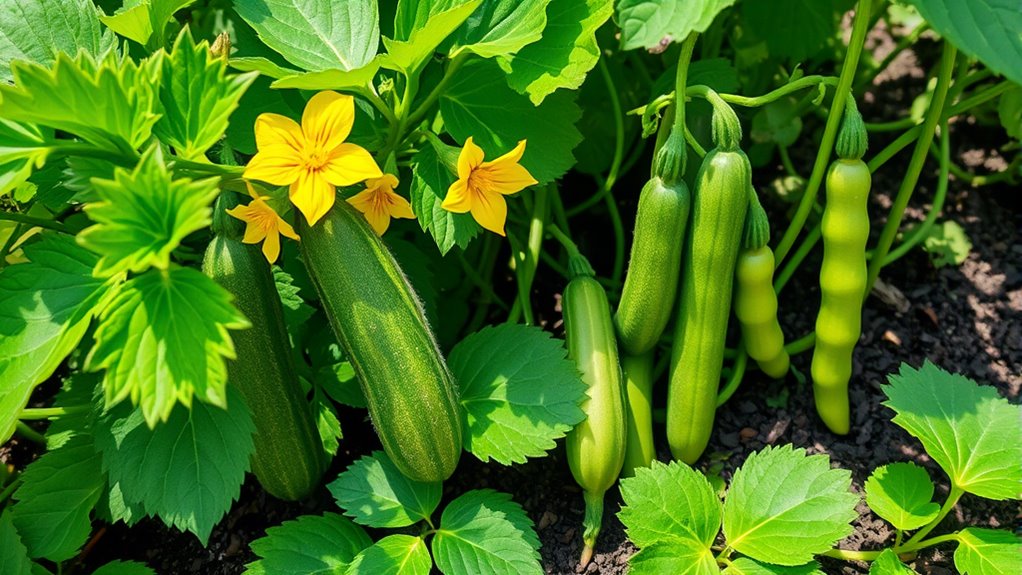
Beans are an excellent addition to your cucumber garden, offering both benefits and companionship. They fix nitrogen in the soil, enriching nutrients for your cucumbers, which thrive with healthy, balanced soil. Additionally, beans grow tall and can provide some shade, helping to keep cucumbers cool during hot days. Their quick growth means you’ll see results fast, and they don’t compete heavily for space or nutrients. Incorporating automation technologies can help manage your garden more efficiently. Plant beans with cucumbers to boost productivity and keep your garden healthy. The mutual benefits of plant companionship can lead to a more successful and sustainable garden environment.
Sunflowers
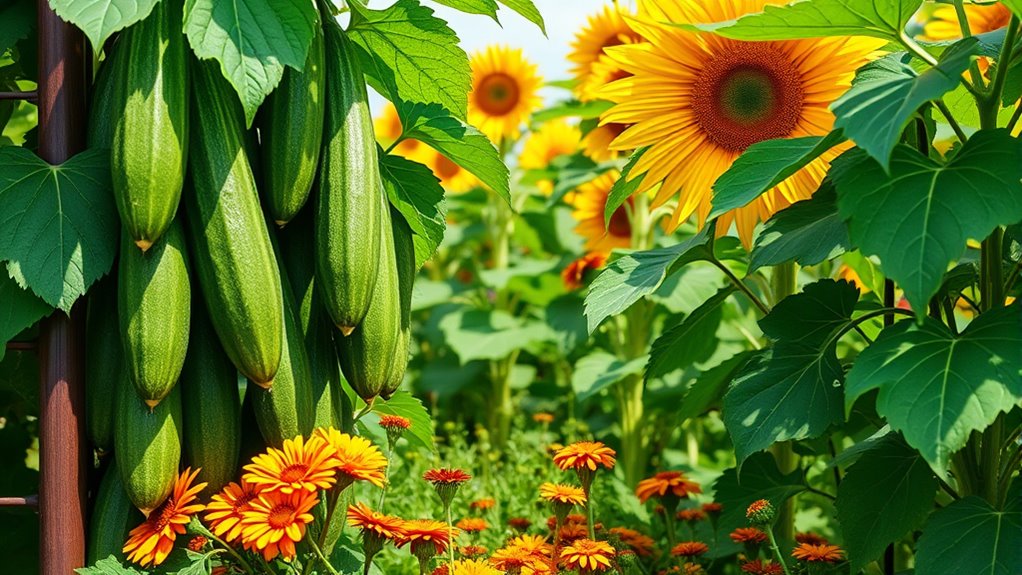
Did you know that sunflowers can be a valuable companion plant for cucumbers? They attract beneficial insects like pollinators and predatory bugs that help control pests. Sunflowers also act as natural windbreaks, shielding your cucumber plants from strong gusts. Additionally, their tall stature provides some shade, preventing cucumbers from overheating in hot weather. Incorporating plant diversification can further enhance the health and productivity of your garden. To maximize benefits, choosing sunflowers that are native to your region can promote a more resilient garden ecosystem.
Frequently Asked Questions
Can Companion Plants Increase Cucumber Yield?
Companion plants can definitely boost your cucumber yield by improving growth conditions and protecting your plants. When you plant certain species nearby, they can repel pests, attract beneficial insects, and enhance soil nutrients. For example, marigolds deter pests, while beans add nitrogen. By choosing the right companions, you create a healthier environment, helping your cucumbers grow bigger and more abundant naturally.
Are There Any Plants to Avoid Near Cucumbers?
Imagine your garden as a busy city, where every plant has a role. Some plants, like fennel and melons, act like disruptive neighbors, attracting pests or spreading diseases that harm your cucumbers. You should avoid planting them nearby, as they can sabotage your cucumbers’ growth. Instead, foster friends that promote health and productivity, ensuring your garden thrives like a well-organized community.
How Do Companion Plants Deter Pests Naturally?
Companion plants naturally deter pests by releasing scents or chemicals that repel insects or attract beneficial insects. When you plant marigolds or nasturtiums near your cucumbers, they emit strong aromas that deter pests like aphids and beetles. These plants also attract predatory insects such as ladybugs and parasitic wasps, which help control pests. By choosing the right companions, you create a natural pest barrier, reducing the need for chemical interventions.
Do Companion Plants Require Special Watering or Fertilizing?
Companion plants usually don’t need special watering or fertilizing beyond what your cucumbers require. You should water them consistently, keeping the soil moist but not waterlogged, and fertilize as needed based on the plant’s growth stage. By maintaining proper watering and fertilization, you help your companion plants thrive, which in turn benefits your cucumbers through natural pest control and improved growth. Keep an eye on their needs for ideal results.
Can Companion Plants Be Used in Organic Gardening?
You might think companion plants are just a bonus, but in organic gardening, they’re your secret weapon. Yes, you can absolutely use them, and they work wonders without synthetic fertilizers or chemicals. These plants enhance soil health, repel pests, and boost your cucumber’s flavor and yield naturally. Embrace this eco-friendly approach, and you’ll transform your garden into a thriving, harmonious paradise where every plant supports the other.
Conclusion
By planting basil, radishes, marigolds, nasturtiums, beans, and sunflowers alongside your cucumbers, you create a thriving garden ecosystem. These companions can help deter pests, improve growth, and boost your harvest. Remember, a wise gardener once said, “A garden is worth a thousand words.” So, choose your plants wisely, nurture them well, and enjoy the bountiful rewards of your thoughtful pairing. Happy gardening!
